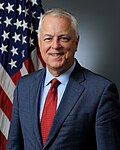Overview
The Office of the Under Secretary of Defense for Policy is the principal staff element of the secretary of defense in the exercise of policy development, planning, resource management, fiscal, and program evaluation responsibilities, the rank of Under Secretary, the USD(P) is a Level III position within the Executive Schedule.
Reporting officials
Officials reporting to the USD(P) include:
- Principal deputy under secretary of defense for policy
Strategy, plans, and capabilities
The assistant secretary of defense for strategy, plans, and capabilities (ASD(SPC)) is responsible for national security and defense strategy, leading the National Defense Strategy, emerging capabilities, security cooperation plans and policies, and force design and development planning.
- The deputy assistant secretary of defense for force development and emerging capabilities provides advice advancing the force development priorities of the Secretary of Defense for implementing the defense strategy, including by devising, facilitating issuance of, and overseeing DoD Component compliance with force planning and programming guidance to balance Joint Force capability, capacity, and readiness for DoD's primary defense missions and emerging security challenges.
- The deputy assistant secretary of defense for global partnerships provides advice on developing policy for security cooperation, humanitarian assistance, and international humanitarian affairs.
- The deputy assistant secretary of defense for plans and posture provides advice on developing and implementing policy, strategic guidance, and oversight of the Department of Defense’s (DoD) operational planning and overseas posture.
- The deputy assistant secretary of defense for strategy provides advice on developing the Department’s national defense strategy and for ensuring that the Department’s program and budget decisions support implementation of the strategy.
International security affairs
The assistant secretary of defense for international security affairs (ASD (ISA)) is responsible for international security strategy, defense policy, and oversight of security cooperation programs and foreign military sales programs relating to Europe, the North Atlantic Treaty Organization, Russia, Eurasia, the Middle East, Africa, and the Western Hemisphere.
- The deputy assistant secretary of defense for African affairs provides advice on international security strategy, defense policy, and oversight of security cooperation programs relating to Africa.
- The deputy assistant secretary of defense for the Middle East provides advice on international security strategy, defense policy, and oversight of security cooperation programs relating to the Middle East and Central Asia.
- The deputy assistant secretary of defense for Europe and NATO provides advice on international security strategy, defense policy, and oversight of security cooperation programs relating to Europe and NATO.
- The deputy assistant secretary of defense for Russia, Ukraine, and Eurasia provides advice on international security strategy, defense policy, and oversight of security cooperation programs relating to conventional arms control, Russia, Ukraine, Western Balkans, and Eurasian nations.
- The secretary of defense representative in the United States Mission to NATO .
- The secretary of defense representative to the Organization for Security and Co-operation in Europe .
Homeland defense and hemispheric affairs
The assistant secretary of defense for homeland defense and hemispheric affairs (ASD(HD&HA)) is responsible for the policy, strategy, and implementation guidance for national and global security issues across countering weapons of mass destruction, cyber operations, homeland defense activities, antiterrorism, continuity of government and mission assurance, and defense support to civil authorities. The ASD(HD&HA) is also responsible for the Protected Critical Infrastructure Program (PCII), the Domestic Preparedness Support Initiative, and the Defense Critical Infrastructure Program (DCIP).
- The deputy assistant secretary of defense for countering weapons of mass destruction is responsible for the policy and guidance for chemical, biological, radiological, and nuclear protection, weapons of mass destruction countermeasures, and counterproliferation and non-proliferation.
- The deputy assistant secretary of defense for homeland defense integration and defense support of civil authorities is responsible for the development, coordination, and oversight of the integration and implementation of plans and policy for defense support of civil authorities and civil-military co-operation.
- The deputy assistant secretary of defense for defense continuity and mission assurance is responsible for the development of policies and plans for continuity of government, mission assurance, counterterrorism, emergency management, and critical infrastructure protection.
Special operations and low-intensity conflict
The assistant secretary of defense for special operations/low-intensity conflict (ASD(SO/LIC)) is responsible for the policy, resources, strategic capabilities and force transformation, and oversight of special operations and low-intensity conflict matters of the United States Department of Defense across counterterrorism, unconventional warfare, direct action, special reconnaissance, foreign internal defense, civil affairs, information and psychological operations, and counterproliferation of weapons of mass destruction.
- The deputy assistant secretary of defense for counternarcotics and global threats is responsible for the policy, resources, strategic capabilities and force transformation, and oversight of special capabilities for counternarcotics and global threats.
- The deputy assistant secretary of defense for stability and humanitarian affairs is responsible for the policy, resources, strategic capabilities and force transformation, and oversight of conflict stabilization activities, peace operations, and humanitarian relief efforts.
- The deputy assistant secretary of defense for special operations and combatting terrorism is responsible for the policy, resources, strategic capabilities and force transformation, and oversight of counterterrorism, counterinsurgency, foreign internal defense, and psychological operations as well as providing staff oversight of the United States Special Operations Command resources, budget, and program development issues.
Indo-Pacific security affairs
The assistant secretary of defense for Indo-Pacific security affairs (ASD(IPSA)) is responsible for international security strategy, defense policy, and oversight of security cooperation programs relating to the Indo-Pacific region.
- The deputy assistant secretary of defense for East Asia provides advice on international security strategy, defense policy, and oversight of security cooperation programs relating to Taiwan, Mongolia, Japan, South Korea, and North Korea.
- The deputy assistant secretary of defense for China provides advice on international security strategy, defense policy, and bilateral security relations relating to China (Including Hong Kong).
- The deputy assistant secretary of defense for South and Southeast Asia provides advice on international security strategy, defense policy, and oversight of security cooperation programs relating to India, Bangladesh, Bhutan, Diego Garcia (in conjunction with ASD(ISA)), Maldives, Nepal, Sri Lanka, Brunei, Burma, Cambodia, East Timor, Indonesia, Laos, Malaysia, Philippines, Singapore, Thailand, Vietnam, Australia, New Zealand, Papua New Guinea, and the Pacific Islands nations.
- The deputy assistant secretary of defense for Afghanistan, Pakistan, and Central Asia provides advice on international security strategy, defense policy, and oversight of security cooperation programs relating to Afghanistan, Pakistan, Kazakhstan, Kyrgyzstan, Tajikistan, Turkmenistan, and Uzbekistan.
Space policy
The assistant secretary of defense for space policy (ASD(SP)) is responsible for the overall supervision of DoD policy for space warfighting, encompassing the Department’s strategic capabilities for integrated deterrence: space, nuclear weapons, cyber, missile defense, electromagnetic warfare, and countering weapons of mass destruction. Additionally, this position served as the Principal Cyber Advisor to the Secretary of Defense.
- The deputy assistant secretary of defense for nuclear and cwmd policy provides advice on developing strategies, informing policies, and conducting oversight of nuclear deterrence policy and arms control, as well as developing and overseeing the implementation of strategies and policies of all countering weapons of mass destruction policy issues.
- The deputy assistant secretary of defense for cyber policy provides advice on establishing DoD cyberspace policy and strategy, providing guidance and oversight on DoD cyberspace activities, and managing DoD’s primary external relationships across the U.S. government, key domestic stakeholders, and our allies and partners.
- The deputy assistant secretary of defense for space and missile defense provides advice on space and integrated air and missile defense posture and policies.
- The deputy principal cyber advisor provides advice on military cyber forces and activities and the implementation of the cyber strategy and execution of the cyber posture review.
Defense Security Cooperation Agency
The director of the Defense Security Cooperation Agency is responsible for providing allies and partner nations with financial and technical assistance, transfer of defense matériel, training, and the promotion of military-to-military contacts.
Defense Technology Security Administration
The director of the Defense Technology Security Administration is responsible for the formulation and enforcement of technology security policies related to international transfers of defense-related goods, services, and technologies.
This page is based on this
Wikipedia article Text is available under the
CC BY-SA 4.0 license; additional terms may apply.
Images, videos and audio are available under their respective licenses.









































